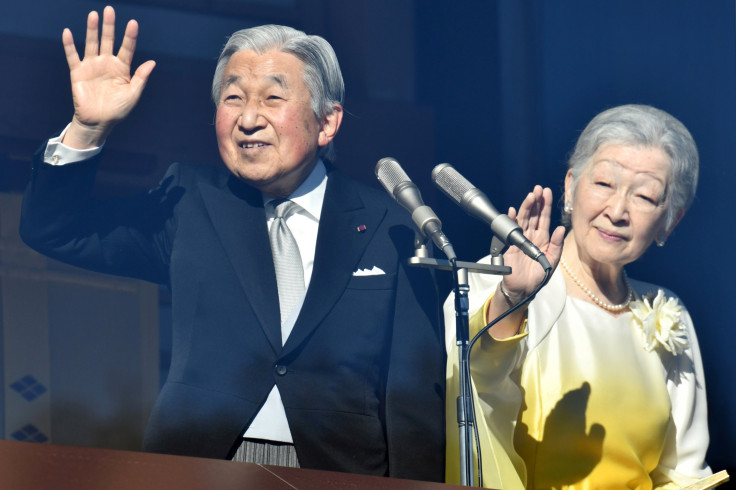Emperor Akihito Abdication: Why Is Japanese Emperor Stepping Down?

Japan's Emperor Akihito, 85, formally abdicated his throne on Tuesday. The historic ceremony was held in Tokyo’s imperial palace. Akihito is the first monarch to step down from the Chrysanthemum Throne in 200 years.
The Emperor’s 30-year-old reign known as the Heisei era comes to an end on Tuesday midnight. Thereafter he will be Emperor Emeritus Akihito.
Marking the abdication, a short ceremony was held at 5 p.m. local time (4 a.m. ET) in the Matsu-no-Ma stateroom of the Imperial Palace. Akihito, Empress Michiko and the Japanese Prime Minister, Shinzo Abe attended the ceremony.
Outside the palace, well-wishers, Japanese people and visitors from abroad thronged the rain-soaked wet grounds.
Speaking live on TV, the outgoing ruler said he performed his duties with a “deep sense of trust and respect to the people.”
Akihito’s farewell address on TV
The public address also saw Akihito handing over the symbols of power and he thanked the public for their support. Akihito expressed the wish that the upcoming Reiwa era will be more stable and fruitful.
In Japan, the emperor is a national figurehead with no political power. Akihito has been special in his love and care for the Japanese people. He never spared an opportunity to interact with those suffering from disease or disaster.
Akihito connects with the public with great ease unlike any other Japanese monarch of the past. He also expressed "deep remorse" for Japan’s actions during World War II.
Ascending the throne on Wednesday will be his son, Crown Prince Naruhito, as the 126th emperor, inaugurating the Reiwa era.
Prince Naruhito is an Oxford graduate and is married to Crown Princess Masako. Their child, Princess Aiko, is 18 years old. Since Japan's law precludes women from inheriting the throne, Aiko's uncle Prince Fumihito will be the next monarch in line.
Health issues hastened abdication
The Emperor had been expressing his desire to be relieved of royal responsibilities. He underwent heart surgery and was also treated for prostate cancer.
In 2016, the monarch cited his failing health in a public address and expressed the wish to step down.
“I am worried that it may become difficult for me to carry out my duties as the symbol of the state with my whole being, as I have done until now,” the Emperor said in a rare TV speech.
The request was granted by Japan's lawmakers.
According to Hitomi Tonomura, a historian at the University of Michigan's Japanese Studies, “the emperor actually had a will of his own.”
The abdication is in sync with the monarch’s penchant to break with traditions. He always led by example. Akihito was the first Japanese Emperor to marry a commoner and often addressed subjects live on television.
Emperor Akihito also played a stellar role in mending ties with neighbors and took steps in repairing Japan's reputation after the last world war.
Oldest monarchy in the world
Japanese monarchy is the oldest hereditary monarchy in the world, dating back to 600 BC. In the past, Japan’s emperors were seen as equivalent to gods.
But that practice ended with Hirohito - the father of Akihito – who publicly renounced his divinity coinciding with Japan's surrender at the end of Second World War.
© Copyright IBTimes 2024. All rights reserved.





















